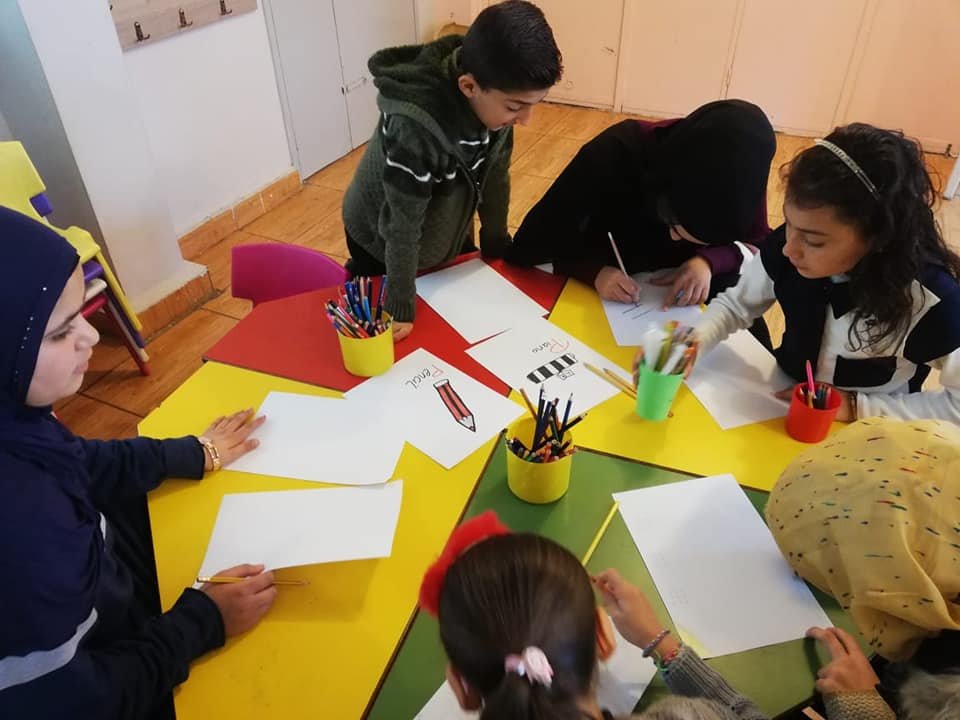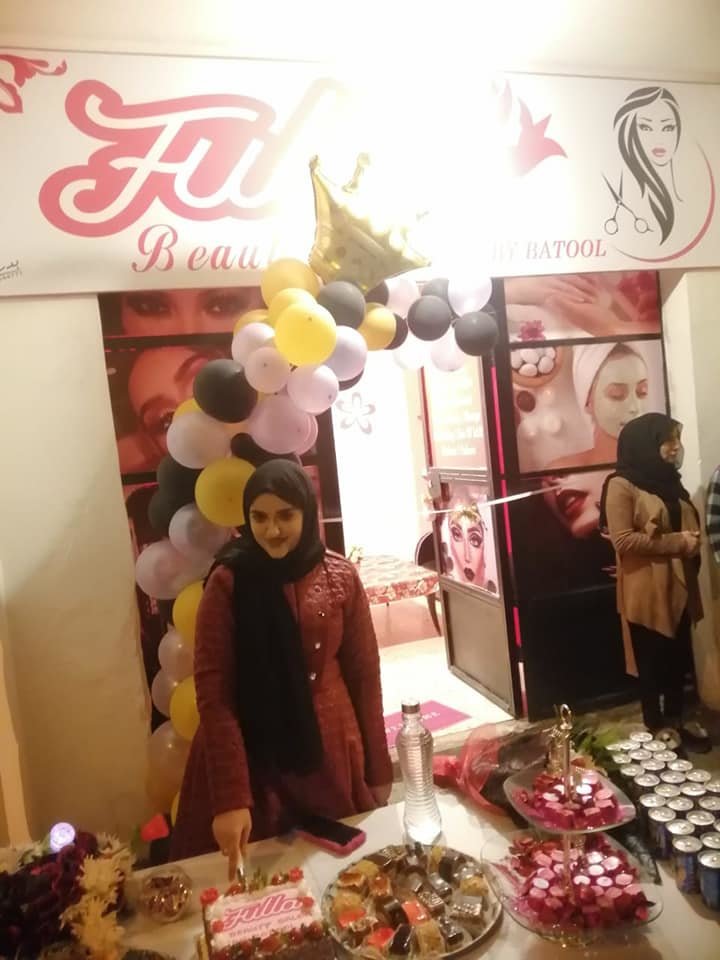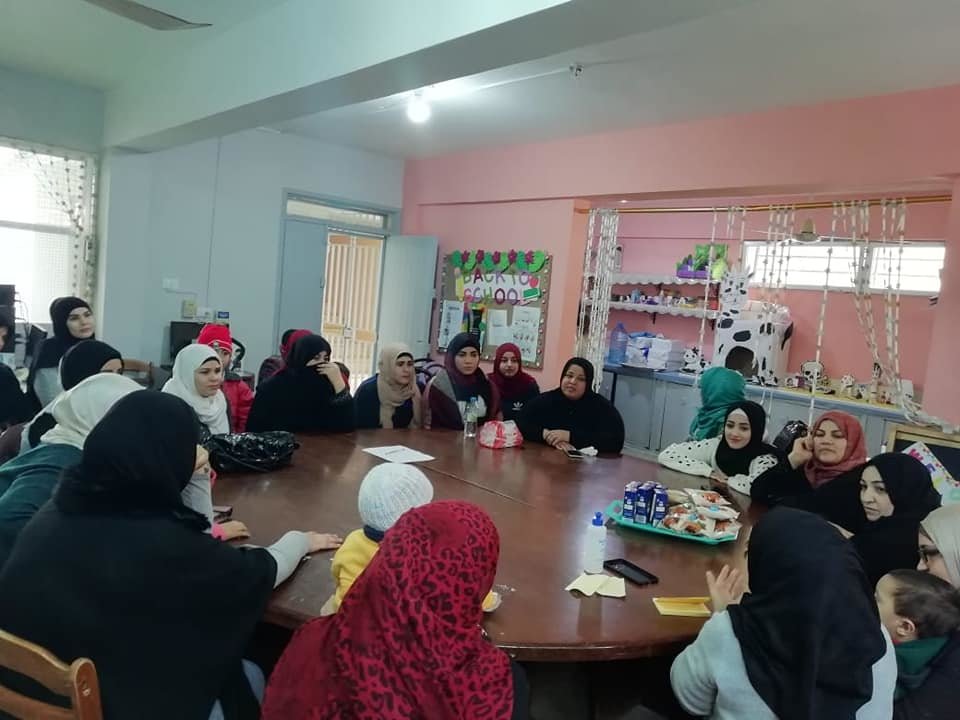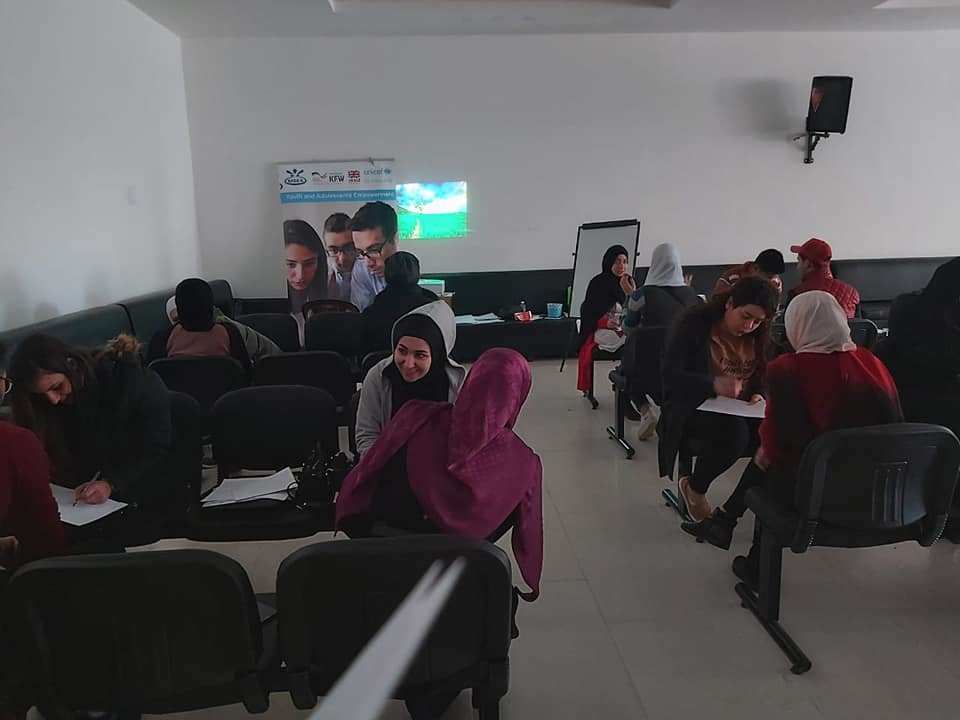By Hiba Hamzi | Program Coordinator
Background during and after the implementation of the project;
Big concerns arise about the needs of the refugees coming from Syria and those who are living inside Ein El Helweh Palestinian refugee camp. Since, the situation of the camp is not secure and intense due to the latest clashes occurred among the Palestinian factions. So that, how to meet these needs and for how long. The big concerns are related to the humanitarian, economic and social aspects of the Syrian crises, and focus on the people who displaced from Syria to the neighboring countries. On top, there is the concern of the continuous mobility of displaced people as a consequence of the unrelenting unstable conditions. Regarding the situation of Ein El Helweh camp, during the reporting period, as those who think that the security situation in Ain el Helweh might calm down or stabilize in the near future are wrong. The camp has turned into a place that is open to all possibilities in light of the deteriorating security status, the clashes, the assassinations and the killings between Fatah on one hand and the other Islamic groups on the other hand. “
Syrian refugees have an average monthly income of LBP418,000, with a median of LBP 450,000 a month. There is a significant gender gap, as females earn 40 per cent less than males. The lowest average monthly incomes were found in Akkar and Tripoli; the highest reported in the South. The low wages are somehow complimented with other sources of income; 36 per cent stated they have other sources of income – relying mainly on UNHCR assistance or personal savings. The survey results show that, on average, refugees took 74 days to find work. While it would take 118 days for a refugee to find work in Tripoli and 97 days in Akkar, it takes around 30 days to find work in the South. Personal networking seems to be an important factor in job seeking as 40 per cent of working refugees found work through a Syrian acquaintance and 36 per cent through a Lebanese acquaintance. Poor occupational health and safety takes its toll on Syrian refugees. The data show that many workers suffer from one or more work-related health conditions or are exposed to hazards at the workplace. One out of two workers reported suffering from back or joint pain or severe fatigue; 60 per cent are exposed to dust and fumes, and 49 per cent to extreme cold or heat. A low percentage (12 per cent) of workers have faced some sort of conflict at work, mainly a result of a personal clash; if a conflict took place, most stated they did not take any action. Finally, very few workers (16 per cent) expressed a need for training to build capacity at work, while a larger number (50 per cent) required tools or equipment. Construction and agricultural tools were needed by males whereas females noted the need for sewing, hairdressing, and agricultural equipment. According to various research and official figures, the Syrian crisis has had negative repercussions on the economy and the labour market. Economic growth has slowed, private investments reduced, the trade deficit has expanded, and real estate and tourism – the two most important sectors – have declined. The Syrian crisis and the influx of refugees into poor communities in the peripheral regions of Lebanon have imposed enormous challenges on the country in general and on host communities in particular. The assessment also included focus group meetings with workers and employers in the North and Bekaa, which highlighted a number of repercussions of the continuous inflow of refugees: - Syrian refugees are mainly concentrated in peripheral areas that are historically poor and deprived, thereby exacerbating their already difficult living conditions. - Competition over job opportunities is one of the most, if not the most, urgent challenges facing host communities. The employment situation has worsened with the increase in labour supply. Syrian workers are accepting lower incomes, work for longer hours and without social benefits; this has led to decreasing wages and a reduction of job opportunities.
Naba’a Achievements; During the last period, The most highlighted achievements during the last period;
- Children and women have been targeted in psychosocial activities as the following, 3051 children (males and females)and 550 parents most of them are women, including, vulnerable Lebanese, Palestinian and Syrian refugees. Whereas, in Borj Al Shamali camp 555 children (males and females and 220 parents including (Lebanese, Syrian Refugees and Palestinian refugees).
- Fostering and reshape the lives of the most marginalized 120 Lebanese, Syrians and Palestinians young and adolescent girls through empowering the vocational skills of the most marginalized Lebanese girls and enrolling them in the vocational training center to study a vocational profession, this might help in preventing them to get married in the early ages and to think of their future in addition to provide an opportunity for them to find a job in the Lebanese community and to integrate with into it, so that their socio-economic situation will be enhanced as they are able to afford their daily expenses without being a burden on their families.
- Empowering and enhancing the skills of the girls to be girls advocacy activists within their communities at the local and national levels.
- Empowerment of women and adolescent girls on protecting themselves from abuse and violence
- Referring women and girls whom are at risk of violence and abuse to psychosocial support, legal aid, etc..
- Advocacy and lobbying, where the community Leaders and influential persons including religious leaders are aware about the risks of child marriage, and agree that marriage should not be contracted before 18 years in any circumstances.
- It is worthy to note that, two child friendly psychosocial spaces were established at two UNRWA clinics (one in Ein El Helweh and one in Wadi El Zeni), where 2350 children whom their families access UNRWA clinics participated and joined the activities in these spaces.
Case study
- Code: EH85 I
- DOB: 45 years
- Nationality: PRS
- Marital status: divorced
- Number of children: 3 boys, 1 girl
Brief about the case:
The survivor is a woman who got married since she was 17 years old and her marital life was tough as she was subjected to violence and exploitation from her husband, where he used to send her to work at houses in order to bring him money to spend on drinks (as alcohol) and drugs.The survivor gave birth to 3 male children, as there is no difference in their ages except one year between each child. During these stages, the survivor suffered from the worst days, as he used to beat her as we’ve mentioned above until she escaped to Lebanon (Ein El-Hilweh camp) in order to live with her father, but the latter did not bear the children, so he asked his daughter to find another house. Consequently, the survivor rented a room to live with her children and subsist them by working inside the homes. After two years, the husband came to the camp and forced her to live with him, and during this period she was subjected to many insults and violence, where he accused her of cheating on him with a young man in the neighborhood which led her father to hit her in the middle of the street and kicked her out from the neighborhood in which she lives in. After that, she got pregnant with a baby girl as she didn’t have the will to keep the baby girl alive, since she tried to abort her, but she was not able to do so, which increased the doubts of her husband that the baby girl isn’t his daughter. Where he forced her to do bad things (as she said) In order not to tell people that she is not a decent woman. It is worth mentioning that, the environment in which she lives in rejects these ideas and view that a murder for a reason like this isn’t a wrong behavior. So the survivor feared about her children and herself, which caused her to do many unpleasant things (selling drugs – taking pictures for women without asking them for a permission for the purpose of oppression to get money).
After that, the survivor felt that she could manage everything without her husband, so she asked for a divorce and moved to another neighborhood to live with her children.
Today, the survivor lives alone with her four children (the children work sometimes to transport things or sell tissue-paper and they don’t want to go to school, as for the girl, she is in our kindergarten. We’re following-up the children, where they are accused of theft - selling drugs and sexual harassment, so we follow up with children at social, economic and psychological level.) Now she is not working and remains asleep throughout the day without paying attention to the children. Ø Her appearance:
Untidy and unclean as it looks tired, there are dark circles under her eyes, as well as her movements indicate that she is using drugs, but she did not admit that.
poor since the house is rented, and there is no furniture except mattress and a wardrobe for clothes. The house from the inside is not clean and not tidy, as she does not care about the children’s hygiene, nor the house, she said. She does not have the money to care about hygiene.
It’s not good since she always suffers from headache, as for the children, their bodies are weak and her daughter gets sick a lot, since she doesn’t feed them well.
Ø The social situation: As for the survivor, she has no friends and the neighbors do not enter their homes for fear of her as she became known in the neighborhood she was not a decent woman. On the other hand, for children they have friends where they play with them on the street and in our center.
The survivor itself, children, community worker.
Ø Intervention:• individual hearings sessions for the survivor• Awareness sessions on the possible risks that she may face • Psychosocial support activities• Individual hearings sessions for children
Ø Recommendations:Supporting the survivor psychologically and socially through individual hearings sessions - awareness sessions – recreational activities.
Child support: remedial support - psychosocial support activities - awareness sessions - individual listening sessions.
Links:
Project reports on GlobalGiving are posted directly to globalgiving.org by Project Leaders as they are completed, generally every 3-4 months. To protect the integrity of these documents, GlobalGiving does not alter them; therefore you may find some language or formatting issues.
If you donate to this project or have donated to this project, you can receive an email when this project posts a report. You can also subscribe for reports without donating.
Support this important cause by creating a personalized fundraising page.
Start a Fundraiser


